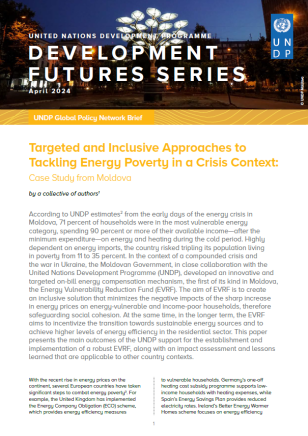Targeted and Inclusive Approaches to Tackling Energy Poverty in a Crisis Context: Case Study from Moldova

Targeted and Inclusive Approaches to Tackling Energy Poverty in a Crisis Context: Case Study from Moldova
pdf (1MB)
DownloadTargeted and Inclusive Approaches to Tackling Energy Poverty in a Crisis Context: Case Study from Moldova
April 15, 2024
According to UNDP estimates from the early days of the energy crisis in Moldova, 71 percent of households were in the most vulnerable energy category, spending 90 percent or more of their available income—after the minimum expenditure—on energy and heating during the cold period. Highly dependent on energy imports, the country risked tripling its population living in poverty from 11 to 35 percent. In the context of a compounded crisis and the war in Ukraine, the Moldovan Government, in close collaboration with the United Nations Development Programme (UNDP), developed an innovative and targeted on-bill energy compensation mechanism, the first of its kind in Moldova, the Energy Vulnerability Reduction Fund (EVRF).
The aim of EVRF is to create an inclusive solution that minimizes the negative impacts of the sharp increase in energy prices on energy-vulnerable and income-poor households, therefore safeguarding social cohesion. At the same time, in the longer term, the EVRF aims to incentivize the transition towards sustainable energy sources and to achieve higher levels of energy efficiency in the residential sector.
This paper presents the main outcomes of the UNDP support for the establishment and implementation of a robust EVRF, along with an impact assessment and lessons learned that are applicable to other country contexts.

 Locations
Locations